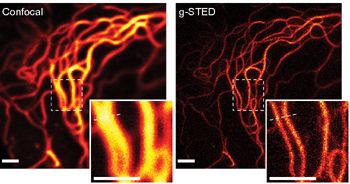Leica Microsystems has signed an agreement with the Max Planck Society and the German Cancer Research Center (DKFZ) for the development of the next generation of super-resolution STED (Stimulated Emission Depletion) microscopy.
This gives Leica Microsystems the license to develop the new technology, called gated STED, into a commercial product and put it on the market.
 g-STED nanoscopy provides fundamentally improved spatial resolution over confocal microscopy in living cells. Here, the protein keratin is marked with the fluorescent protein Citrine in a living PtK2 cell. The insets show a magnified view of the marked areas, demonstrating the separation of features as small as 60 nm in the living cell. Fluorescence excitation at 485 nm, STED at 592 nm wavelength using a CW beam. Scale bars 1 ìm. Copyright Max Planck Institute for Biophysical Chemistry.
g-STED nanoscopy provides fundamentally improved spatial resolution over confocal microscopy in living cells. Here, the protein keratin is marked with the fluorescent protein Citrine in a living PtK2 cell. The insets show a magnified view of the marked areas, demonstrating the separation of features as small as 60 nm in the living cell. Fluorescence excitation at 485 nm, STED at 592 nm wavelength using a CW beam. Scale bars 1 ìm. Copyright Max Planck Institute for Biophysical Chemistry.
Professor Stefan Hell, Director at the Max Planck Institute for Biophysical Chemistry, has taken his idea of STED microscopy a momentous step further with gated STED: The new technology significantly improves the resolution and contrast previously attained with CW-STED (Continuous-Wave Stimulated Emission Depletion) microscopy, while distinctly reducing laser intensity. This enhances photostability as well as live cell capability, substantially extending the range of possible applications.
Also, gated STED technology will considerably increase the number of questions that can be addressed with STED fluorescence correlation spectroscopy (STED-FCS). The main application of gated STED FCS will be the observation of molecule movements in the membrane of living cells.
The new product of Leica Microsystems will be launched in the first half of the year 2012. Thanks to Leica Microsystems’ modular concept, the Leica TCS SP5 and Leica TCS STED CW confocal systems already on the market can be upgraded with gated STED.
“We’re delighted to be able to continue the provenly successful cooperation with the Max Planck Society, its technology transfer organization Max Planck Innovation and the DKFZ with this trailblazing product development,” says Dr. Stefan Traeger, Vice President of Leica Microsystems’ Life Science Division. “The new gated STED microscope will enable us to further strengthen our technological lead in super-resolution microscopy especially for confocal systems. “